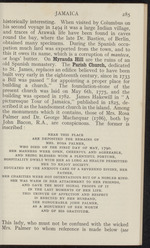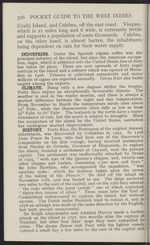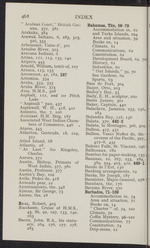| 1 |
 |
“...JAMAICA 285
historically interesting. When visited by Columbus on
his second voyage in 1494 it was a large Indian village
and traces of Arawak life have been found in caves
round the bay, where the late Dr. Bastien, of Berlin,
obtained many specimens. During the Spanish occu-
pation much lard was exported from the town, and to
this it owes its name, which is a corruption of manteca,
or hogs’ butter. On Myranda Hill are the ruins of an
old Spanish monastery. The Parish Church, dedicated
to St. James, replaces an edifice believed to have been
built very early in the eighteenth century, since in 1733
a Bill was passed “ for appointing a proper place for
building a church.” The foundation-stone of the
present chinch was laid on May 6th, 1775, and the
building was opened in 1782. James Hakewill in “ A
picturesque Tour of Jamaica,” published in 1825, de-
scribed it as the handsomest church in the island. Among
the monuments which it contains, those of Mrs. Rosa
Palmer and Dr. George Macfarquar...”
|
|
| 2 |
 |
“...months, and there is always a I
marked difference between the night and day temperatures. |
From November to March the temperature rarely rises above 1
75° Fahr., while the thermometer often falls as low as from I
50° Fahr. to 6o° Fahr. The lowlands in the north have a super- 1
abundance of rain, but the south is subject to droughts. ^ Since I
the occupation of the island by the United States, sanitation I
has undergone marked improvement. . 1
HISTORY. Porto Rico, the Borinquen of the original Arawak I
inhabitants, was discovered by Columbus in 1495- 1° I5°81
Juan Ponce de Leon, who had been one of the discoverer s 1
companions on his first voyage, having received permission!
from Nicolas de Ovanda, Governor of Hispaniola, to explore*
the island, founded a settlement at Caparra, near the present!
capital. The settlement was ineffectually attacked by Drake!
in 1595, "with sixe of the Queene’s shippes, and, twenty-one!
other shippes and barkes, containing 2,500 men and boys. ■
Sir John Hawkins...”
|
|
| 3 |
 |
“...468 INDEX
" Arabian Coast,” British Gui-
ana, 372, 381
Arakaka, 384
Arawak Indians, 6, 285, 313,
326, 353
Arboussier, Usine d’, 301
Arecibo River, 325
Arecuna Indians, 6
Arima, in, 115, 135, 140
Aripero, 443
Arnold, William, tomb of, 107
Arouca, 115, 135
Arrowroot, 42, 182, 187
Artemisa, 354
Aruba, 333, 335
Aruka River, 374
Asia, 308
Asphalt, 112, and see Pitch
Lake
“ Aspinall ” pan, 437
Aspinwall, W. H., 418, 421
Assiento, the, 7, 106
Assistant, H.M. Brig, 187
Associated West Indian Cham-
bers of Commerce, 446 ,
Atares, 345
Atherton, Gertrude, 18, 229,
322
Athol Island, 68
Atlantis, 28
“ At Last." See Kingsley,
Charles.
Aurora, 372
Austin, Bishop, Primate of
West Indies, 377, 380
Austin, Professor, 377
Austin’s Bay, 102
Avila, Pedro de, 418
Avocado pear, 22
Ayuntamiento, the, 348
Ayscue, Sir George, 73
Azores, the, 28
Baal, Robert, 405
Bacchante, Cruise of H.M.S.,
45. 86, 92, 107, 133, 140,
163
Bacon, John, R.A., his statu-
ary, 264, 276, 277, 278,
285
Bahamas, The, 50-70
Accommodation...”
|
|
